[Mac M2 Pro 12CPU, Sonoma 14.5, clang++ 15.0.0]
低コスト版のgpt-4o-miniがリリースされたので早速試してみました。
OpenAIが示すスコアではプログラミング能力がgpt-4oの90.2%とさほど変わらない87.2%だったので期待したのですが、私の用途では一発不合格でした。
関数の例を示して新たな関数を作るように指示しているのに例示した関数を含んだ関数を作成するのは論外です。英語なら能力が高いのかもしれません。
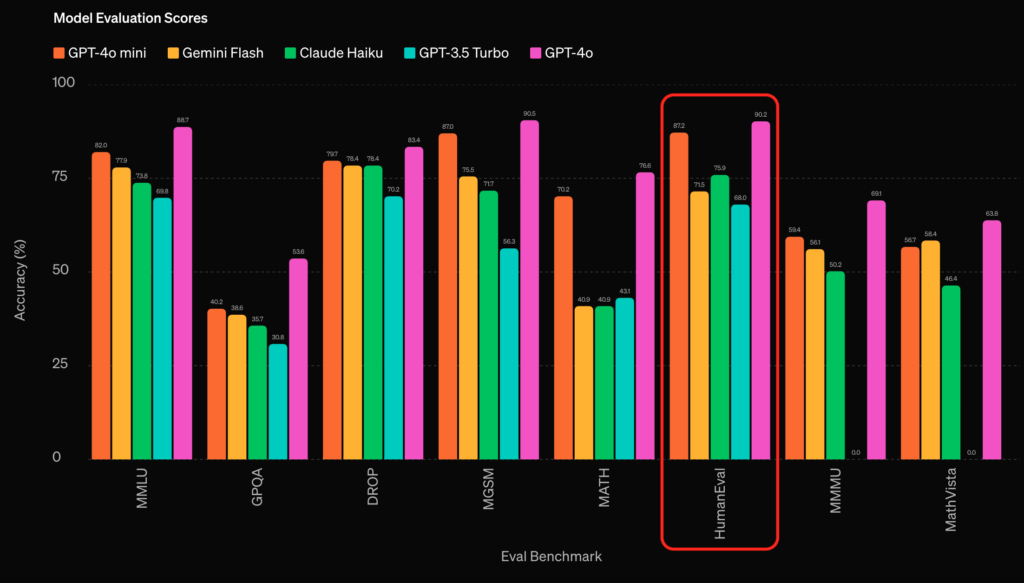
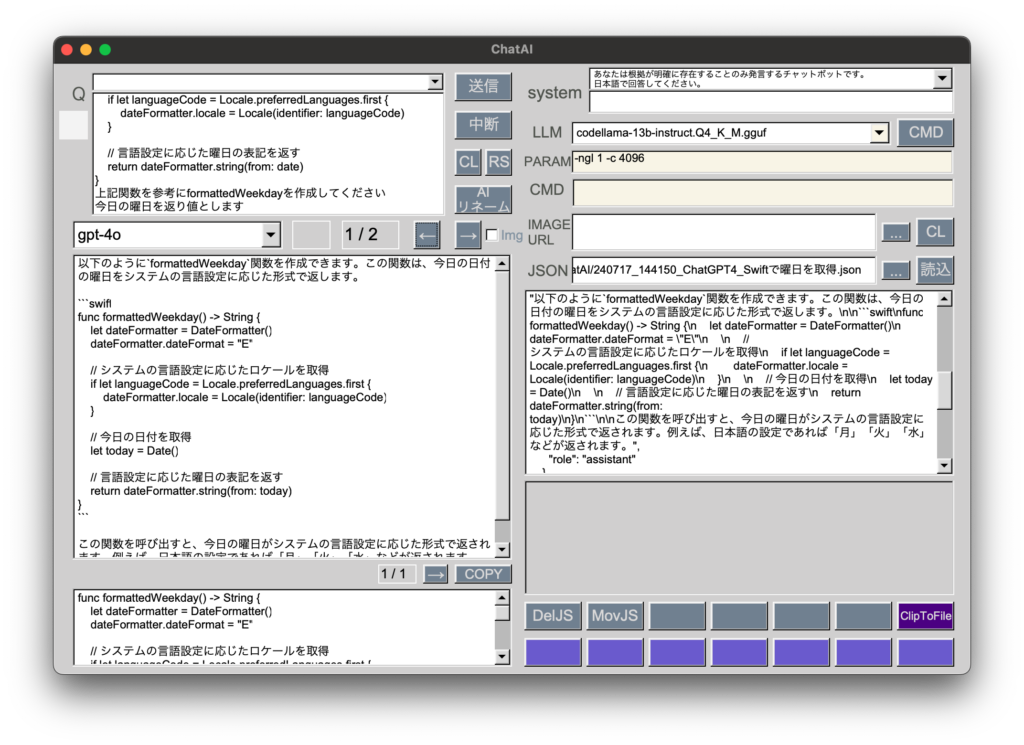
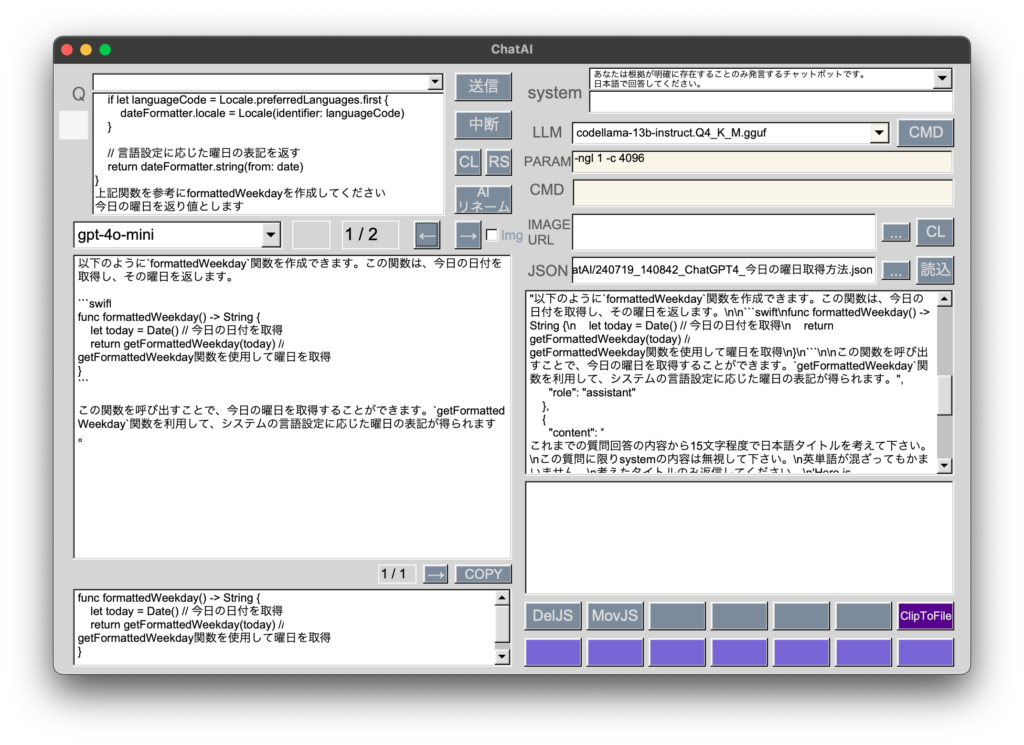
[Mac M2 Pro 12CPU, Sonoma 14.5, clang++ 15.0.0]
低コスト版のgpt-4o-miniがリリースされたので早速試してみました。
OpenAIが示すスコアではプログラミング能力がgpt-4oの90.2%とさほど変わらない87.2%だったので期待したのですが、私の用途では一発不合格でした。
関数の例を示して新たな関数を作るように指示しているのに例示した関数を含んだ関数を作成するのは論外です。英語なら能力が高いのかもしれません。



[Mac M2 Pro 12CPU, Sonoma 14.5, wxWidgets 3.2.5]
設定データを保存する方法としてCSVを考えていましたが、macOSアプリですからOS固有の方法を活用してみたくなりました。
Objective-C++で書いた関数を使って設定データをUserDefaultsで管理するようにしました。
以前開発していたBBSブラウザと同様、cppファイルとmmファイルがプロジェクトに混在する形となります。
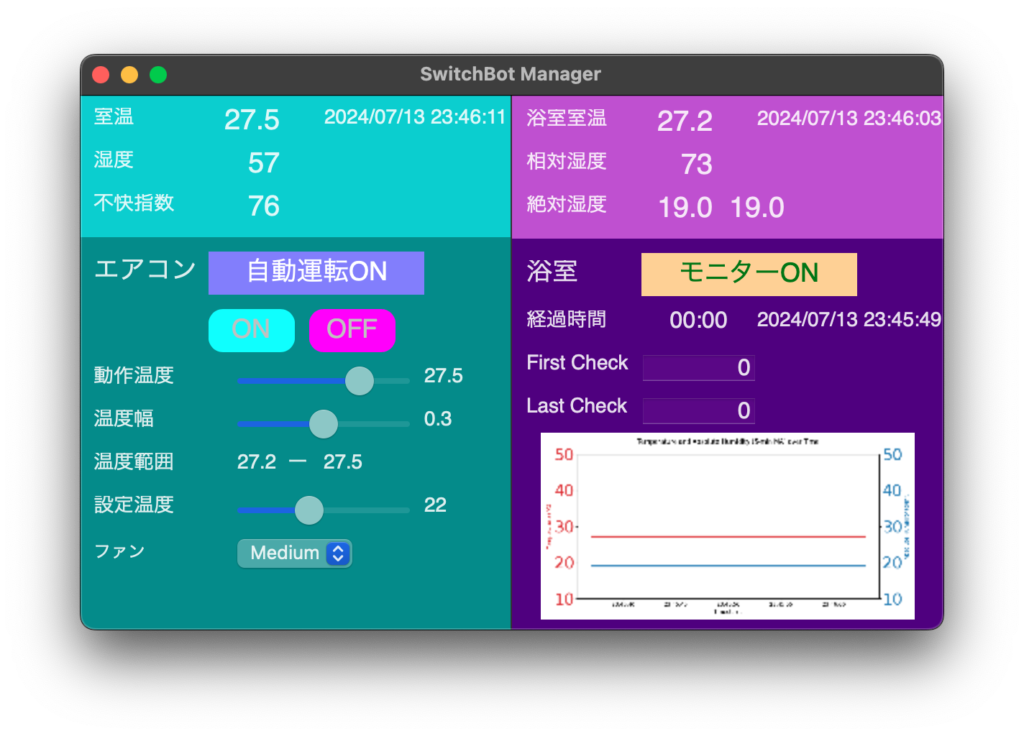
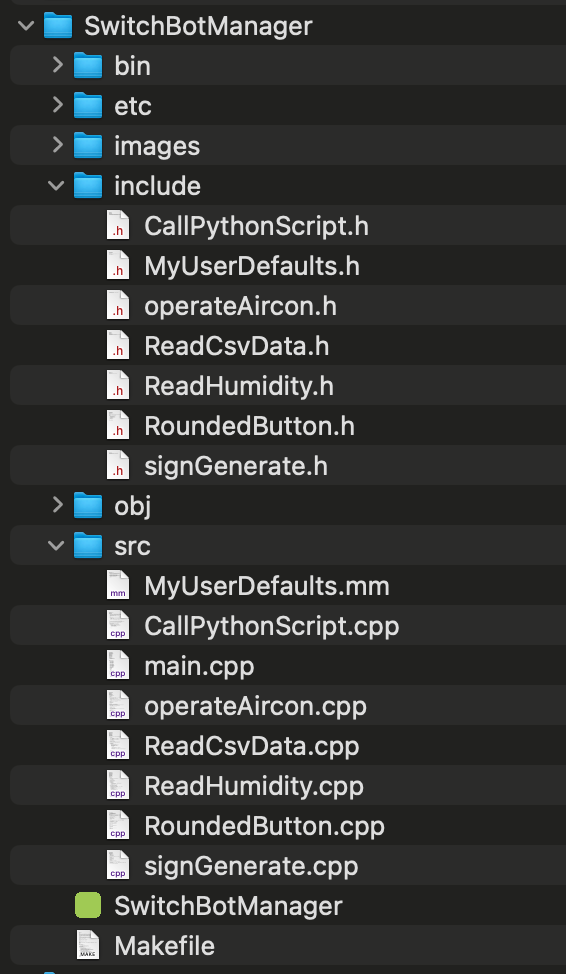
#include <iostream>
#import <Foundation/Foundation.h>
void saveToUserDefaults(const std::string& key, const std::string& value) {
NSString *nsKey = [NSString stringWithUTF8String:key.c_str()];
NSString *nsValue = [NSString stringWithUTF8String:value.c_str()];
[[NSUserDefaults standardUserDefaults] setObject:nsValue forKey:nsKey];
[[NSUserDefaults standardUserDefaults] synchronize];
}
std::string getFromUserDefaults(const std::string& key) {
NSString *nsKey = [NSString stringWithUTF8String:key.c_str()];
NSString *nsValue = [[NSUserDefaults standardUserDefaults] stringForKey:nsKey];
if (nsValue) {
return std::string([nsValue UTF8String]);
} else {
return "";
}
}[Mac M2 Pro 12CPU, Sonoma 14.5, wxWidgets 3.2.5]
エアコン自動運転機能を実装しました。
エアコン動作温度を0.1度単位で設定し、温度幅を純正アプリの0.5度から最小0.1度にすることができます。
これでエアコン操作をこのアプリに任せて、なおかつ浴室の状態を常にモニタリングできるようになりました。グラフは過去の数値を最大4時間分プロットしています。
次はiPhone版やiPad版をC++(Objective-C++)ベースで作れるかどうか検討します。
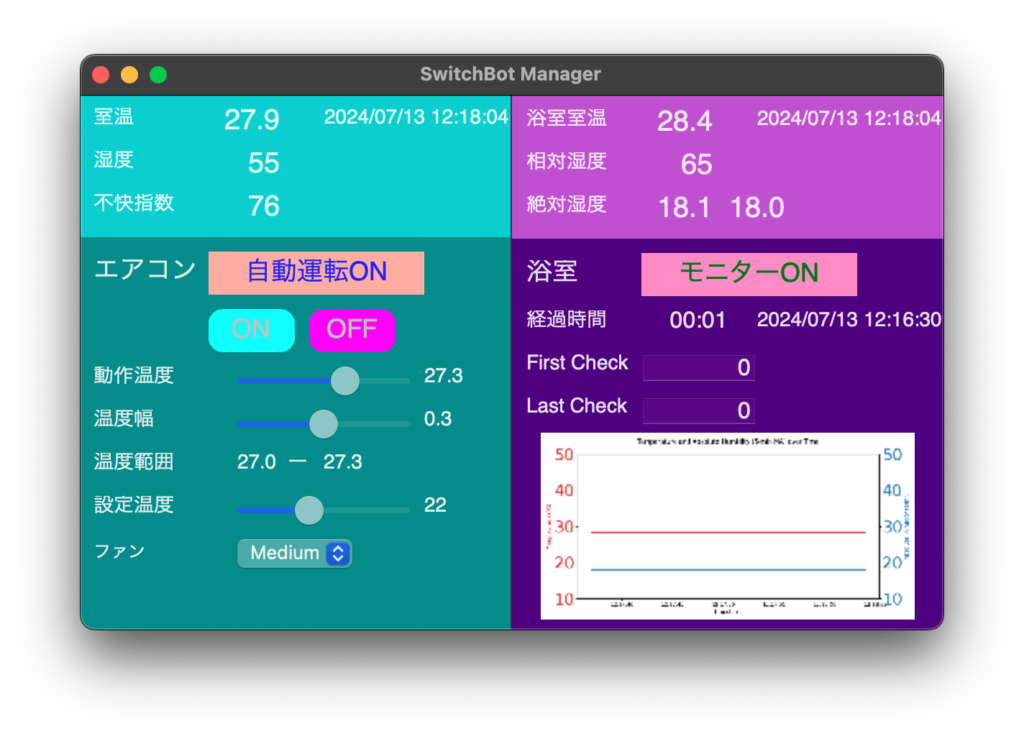
[Mac M2 Pro 12CPU, Sonoma 14.5, wxWidgets 3.2.5]
C++にはmatplotlibライブラリに匹敵するグラフ作成ライブラリが見つからず、ラッパーであるmatplotlib-cppは古いためかアプリがクラッシュします。
Py_Initialize()などを使ってPythonスクリプトをモジュール化しましたが、wxWidgetsのonTimer関数ではうまく動作せず落ちてしまうので、スクリプトのままターミナルで実行しました。
これで絶対湿度など数値とグラフをチェックし、進捗を確認できるようになりました。
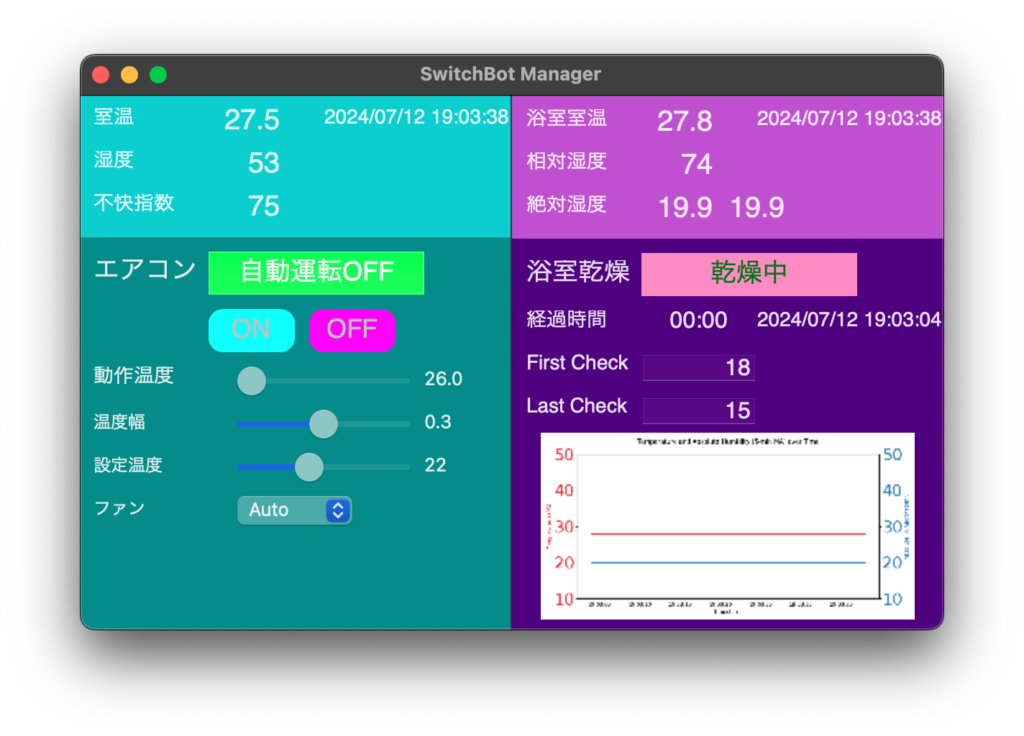
#include "CallPythonScript.h"
#include <cstdio>
#include <string>
#include <iostream>
#include <fstream>
void CallPythonScript(const std::string& csvPath, const std::string& pngPath) {
std::string scriptPath = "GenerateGraph.py";
std::string command = "/usr/local/bin/python " + scriptPath + " " + csvPath + " " + pngPath + " > /dev/null 2>&1";
FILE* pipe = popen(command.c_str(), "r");
if (!pipe) {
std::cerr << "Failed to execute Python script" << std::endl;
return;
}
int result = pclose(pipe);
if (result != 0) {
std::cerr << "Failed to execute Python script" << std::endl;
} else {
std::ifstream file(pngPath);
if (!file) {
std::cerr << "PNG file not found or cannot be opened" << std::endl;
} else {
std::cout << "PNG file created successfully" << std::endl;
}
}
}[Mac M2 Pro 12CPU, Sonoma 14.5, wxWidgets 3.2.5]
洗濯物が乾燥しているであろう絶対湿度まで下がる過程で段階的にアプリの表示が変わるようにしました。
絶対湿度は5分間の移動平均値(右側の数値)で判定しています。
あとは実際の浴室乾燥でテストしながらアプリを調整していきます。
これでガス代を少しは節約できそうです。また浴室の相対湿度を70%以下に近づけるよう意識することでカビの発生を低減できます。
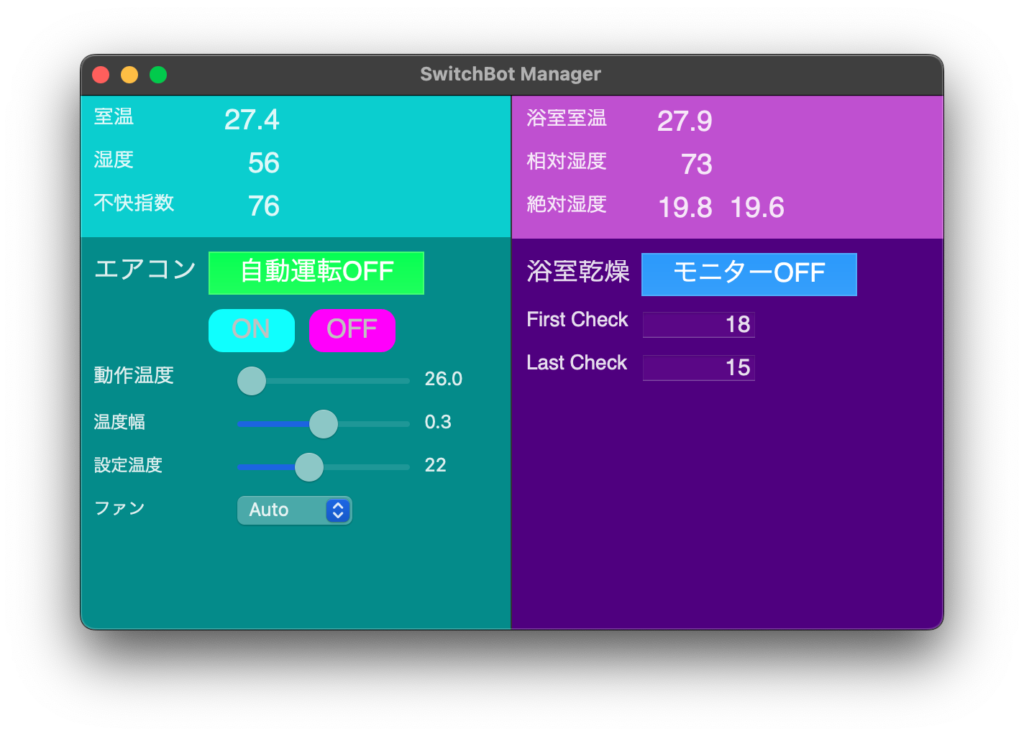
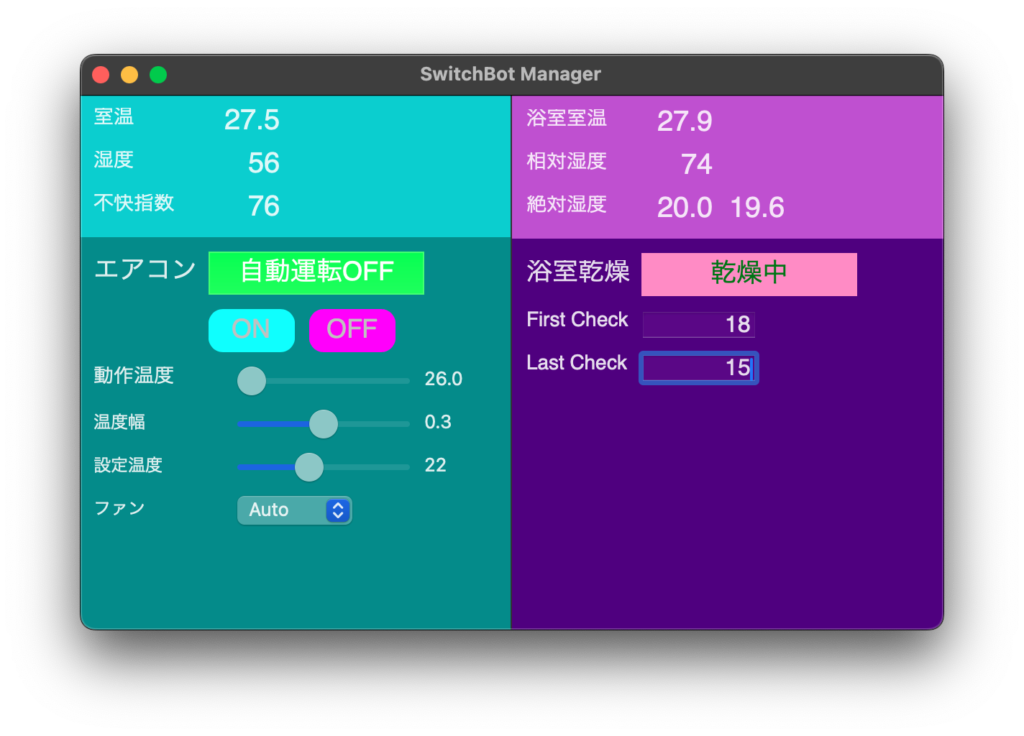
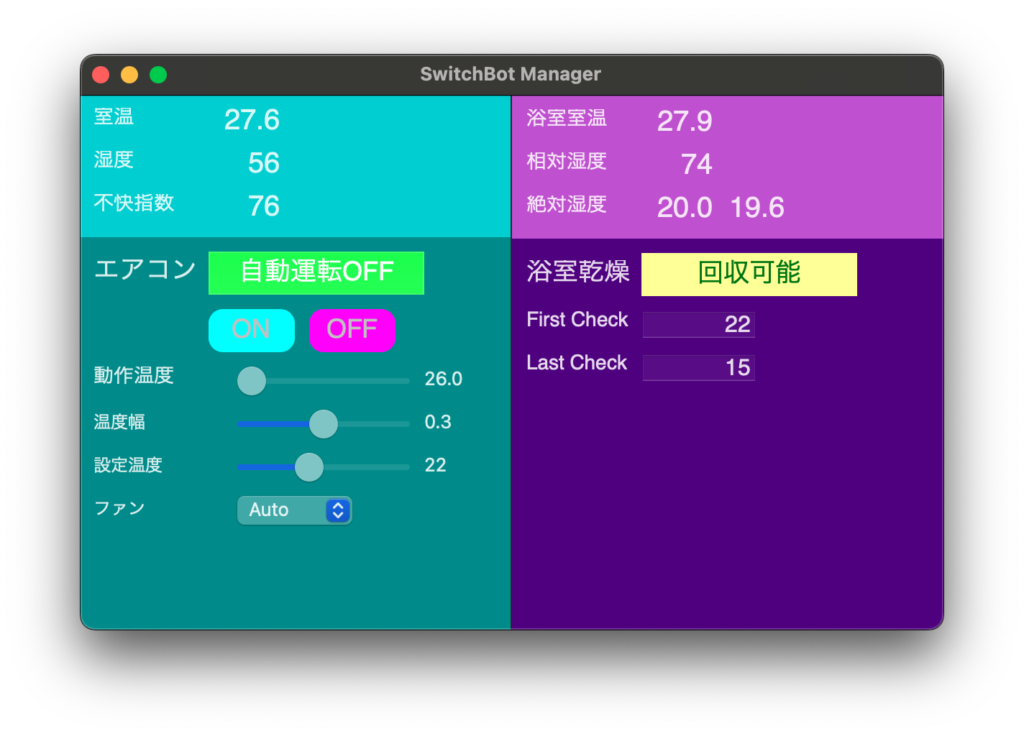
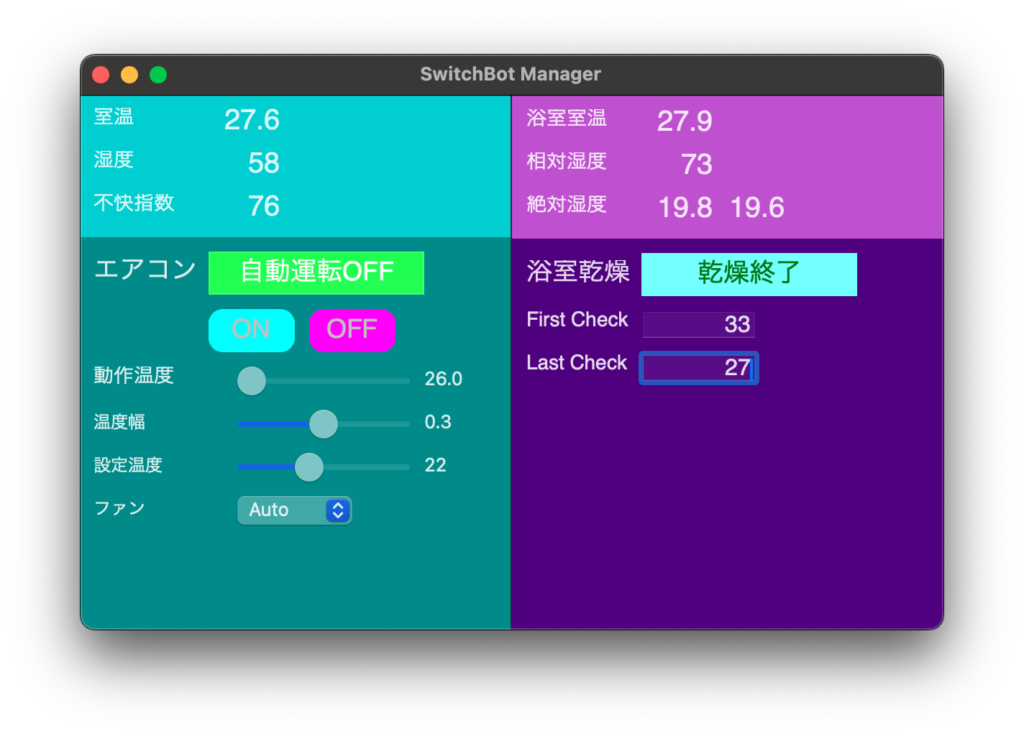
[Mac M2 Pro 12CPU, Sonoma 14.5, wxWidgets 3.2.5]
エアコンを操作するAPIリクエストのところでつまづきました。
Pythonでは100%成功していましたが、C++では成功率50%以下になりました。色々調べた結果、HMAC_CTXによる署名生成に問題があることが判明し、これを使わずに署名生成して解決しました。
Pythonではシンプルに正常なコードになる場合でも、C++に移植するのは容易ではないことがたまにあります。
#include "signGenerate.h"
#include <openssl/hmac.h>
#include <openssl/sha.h>
#include <openssl/buffer.h>
#include <uuid/uuid.h>
std::string generate_uuid() {
uuid_t uuid;
uuid_generate_random(uuid);
char uuid_str[37];
uuid_unparse(uuid, uuid_str);
return std::string(uuid_str);
}
std::string base64_encode(const unsigned char* input, int length) {
BIO *bmem, *b64;
BUF_MEM *bptr;
b64 = BIO_new(BIO_f_base64());
bmem = BIO_new(BIO_s_mem());
b64 = BIO_push(b64, bmem);
BIO_write(b64, input, length);
BIO_flush(b64);
BIO_get_mem_ptr(b64, &bptr);
std::string output(bptr->data, bptr->length - 1);
BIO_free_all(b64);
return output;
}
std::string hmac_sha256(const std::string& key, const std::string& data) {
unsigned char* digest;
digest = HMAC(EVP_sha256(), key.c_str(), key.length(), (unsigned char*)data.c_str(), data.length(), NULL, NULL);
return std::string((char*)digest, SHA256_DIGEST_LENGTH);
}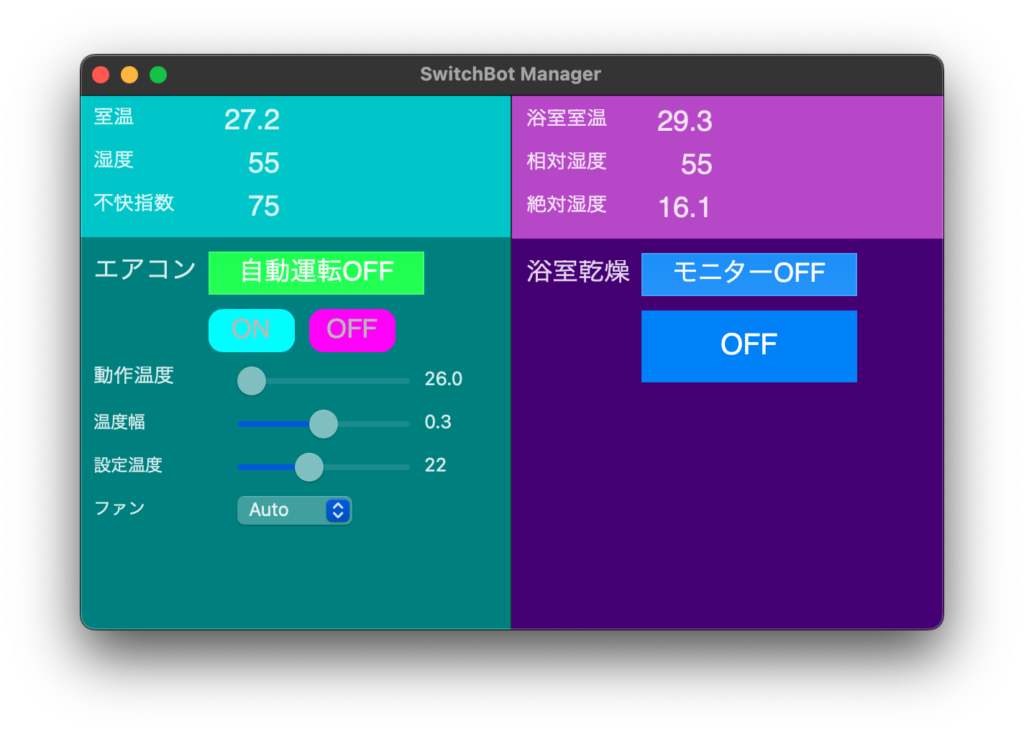
[Mac M2 Pro 12CPU, Sonoma 14.5, wxWidgets 3.2.5]
右側の浴室乾燥のところにも手を付けました。
とりあえずガワだけそれなりに整えます。
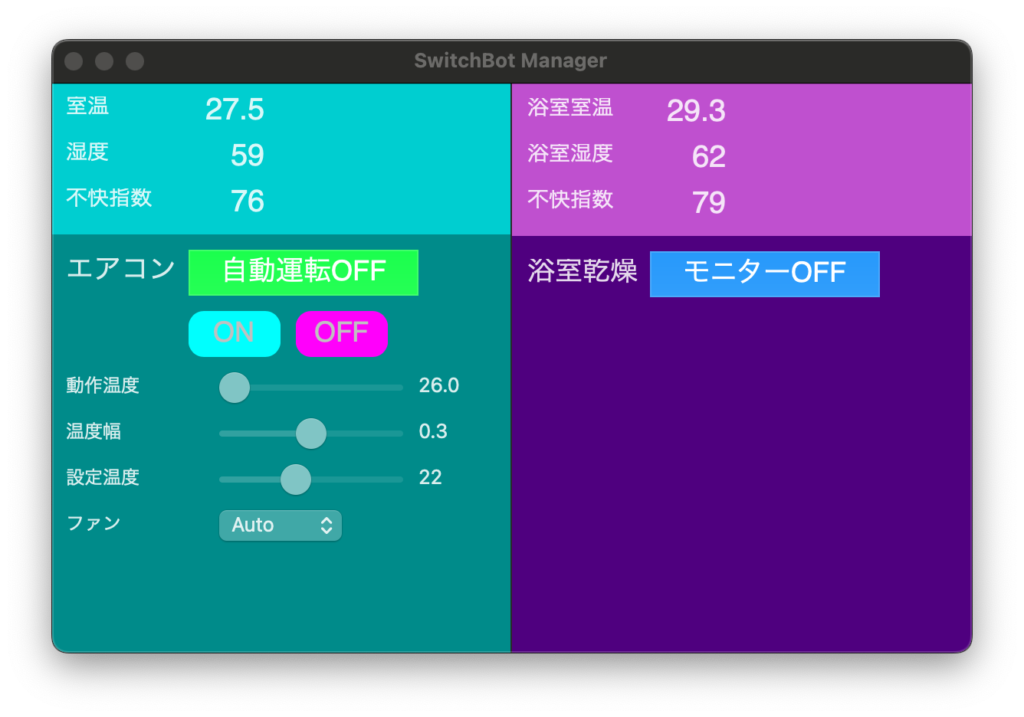
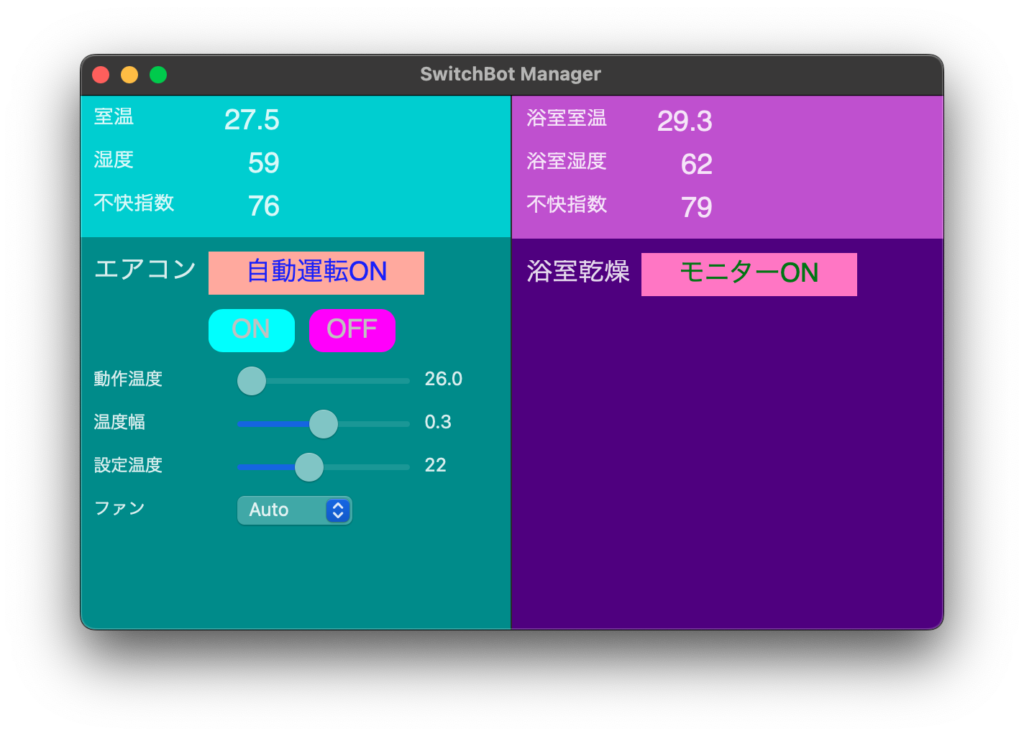
[Mac M2 Pro 12CPU, Sonoma 14.5, wxWidgets 3.2.5]
ボタンの角を丸くして枠を消しラベル色と背景色を指定できるRoundedButtonクラスをChatGPTに作成してもらいました。当然ヘッダファイルもさくっと作ってくれます。
FLTKを苦労して学んでいたころからは信じられない楽さです。もっともあのころにC++の基本やMakefileの作り方を習得していたからできることではあります。
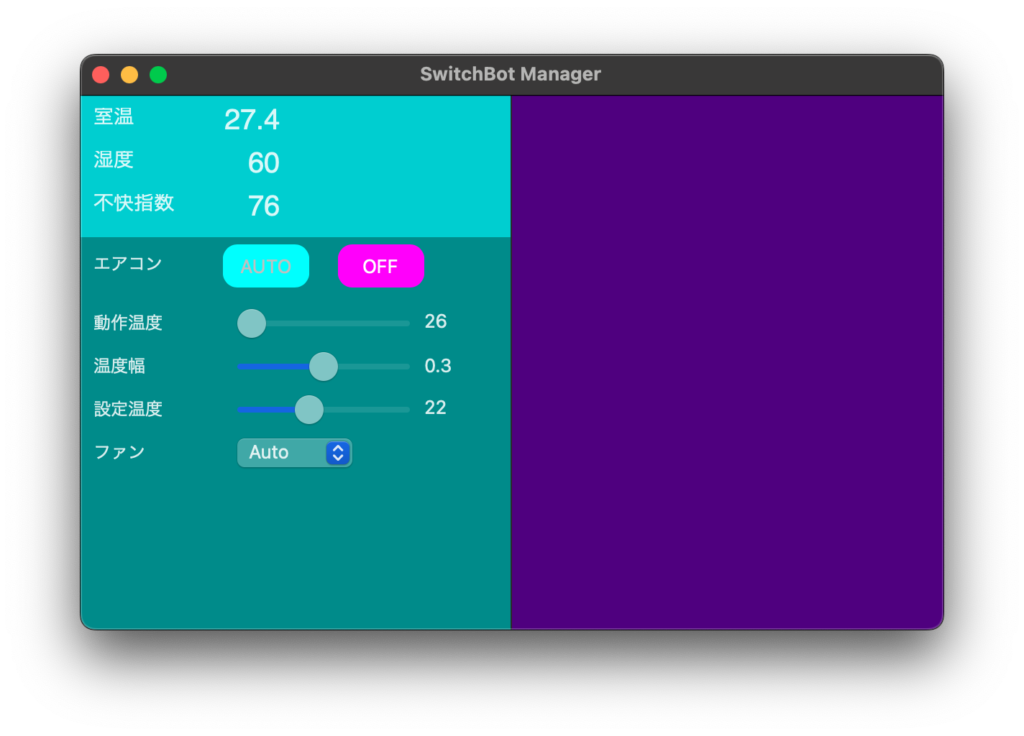
#include "RoundedButton.h"
RoundedButton::RoundedButton(wxWindow* parent, wxWindowID id, const wxString& label, const wxPoint& pos, const wxSize& size, const wxColour& bgColor, const wxColour& labelColor)
: wxButton(parent, id, label, pos, size), m_bgColor(bgColor), m_labelColor(labelColor)
{
SetBackgroundStyle(wxBG_STYLE_PAINT);
Bind(wxEVT_PAINT, &RoundedButton::OnPaint, this);
}
void RoundedButton::OnPaint(wxPaintEvent& event)
{
wxAutoBufferedPaintDC dc(this);
wxSize size = GetSize();
wxRect rect(0, 0, size.x, size.y);
dc.SetBrush(wxBrush(m_bgColor));
dc.SetPen(*wxTRANSPARENT_PEN);
dc.DrawRoundedRectangle(rect, 10); // 角の半径を10に設定
dc.SetTextForeground(m_labelColor); // ラベルの色を設定
dc.DrawLabel(GetLabel(), rect, wxALIGN_CENTER);
}// AUTOボタン
new RoundedButton(bottomPanel, wxID_ANY, "AUTO", wxPoint(100, 5), wxSize(60, 30), wxColour("#00FFFF"), wxColour("#C0C0C0")); // シアン背景、白ラベル
// OFFボタン
new RoundedButton(bottomPanel, wxID_ANY, "OFF", wxPoint(180, 5), wxSize(60, 30), wxColour("#FF00FF"), wxColour("#FFFFFF")); // マゼンタ背景、白ラベル[Mac M2 Pro 12CPU, Sonoma 14.5, wxWidgets 3.2.5]
wxWidgetsのコードはFLTKとはまた違った独特のクセがあります。
ChatGPTにGUIのコードを書いてもらいました。Swiftと遜色ない洗練された外観です。
やはりGUIは座標を使うのが楽です。SwiftUIやJavaのSwingは書きにくくて苦手です。
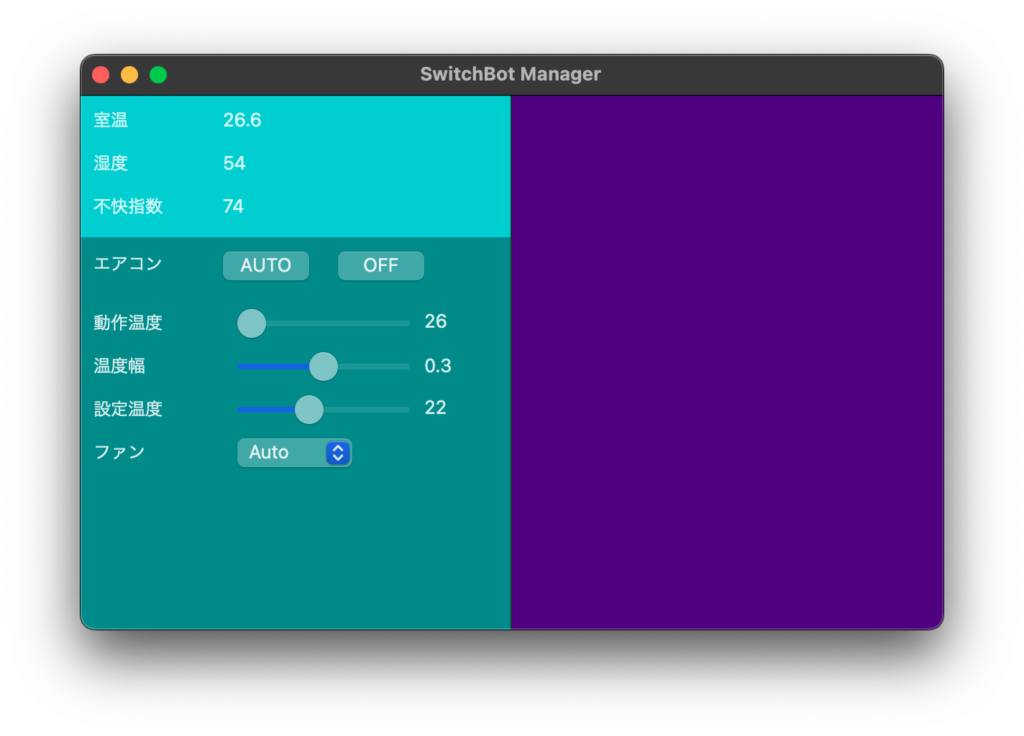
#include <wx/wx.h>
#include <wx/slider.h>
#include <wx/stattext.h>
#include <wx/choice.h>
#include <wx/panel.h>
#include <wx/sizer.h>
#include <wx/image.h>
#include <wx/bitmap.h>
#include "functions.h"
class MyFrame : public wxFrame
{
public:
MyFrame() : wxFrame(NULL, wxID_ANY, "SwitchBot Manager", wxDefaultPosition, wxSize(600, 400))
{
// パネルを左右に分割
wxPanel* leftPanel = new wxPanel(this, wxID_ANY, wxDefaultPosition, wxSize(300, 400));
wxPanel* rightPanel = new wxPanel(this, wxID_ANY, wxPoint(300, 0), wxSize(300, 400));
// 背景色の設定
leftPanel->SetBackgroundColour(wxColour("#00CED1"));
rightPanel->SetBackgroundColour(wxColour("#4B0082"));
// 下部のパネルを追加して背景色を設定
wxPanel* bottomPanel = new wxPanel(leftPanel, wxID_ANY, wxPoint(0, 100), wxSize(300, 300));
bottomPanel->SetBackgroundColour(wxColour("#008B8B"));
// CSVからのデータ読み込み
std::vector<double> data = ReadCsvData();
// 室温と湿度
new wxStaticText(leftPanel, wxID_ANY, "室温", wxPoint(10, 10), wxSize(80, 20));
new wxStaticText(leftPanel, wxID_ANY, wxString::Format("%.1f", data[0]), wxPoint(100, 10), wxSize(80, 20));
new wxStaticText(leftPanel, wxID_ANY, "湿度", wxPoint(10, 40), wxSize(80, 20));
new wxStaticText(leftPanel, wxID_ANY, wxString::Format("%.0f", data[1]), wxPoint(100, 40), wxSize(80, 20));
// 不快指数
new wxStaticText(leftPanel, wxID_ANY, "不快指数", wxPoint(10, 70), wxSize(80, 20));
new wxStaticText(leftPanel, wxID_ANY, wxString::Format("%.0f", data[2]), wxPoint(100, 70), wxSize(80, 20));
// エアコン
new wxStaticText(bottomPanel, wxID_ANY, "エアコン", wxPoint(10, 10), wxSize(80, 20));
// AUTOボタン
new wxButton(bottomPanel, wxID_ANY, "AUTO", wxPoint(100, 5), wxSize(60, 30));
// OFFボタン
new wxButton(bottomPanel, wxID_ANY, "OFF", wxPoint(180, 5), wxSize(60, 30));
// 動作温度
new wxStaticText(bottomPanel, wxID_ANY, "動作温度", wxPoint(10, 51), wxSize(72, 18));
wxSlider* operationTempSlider = new wxSlider(bottomPanel, wxID_ANY, 26, 26, 28, wxPoint(110, 50), wxSize(120, 20), wxSL_HORIZONTAL);
wxStaticText* operationTempDisplay = new wxStaticText(bottomPanel, wxID_ANY, "26", wxPoint(240, 50), wxSize(40, 20));
// 温度幅
new wxStaticText(bottomPanel, wxID_ANY, "温度幅", wxPoint(10, 81), wxSize(54, 18));
wxSlider* tempRangeSlider = new wxSlider(bottomPanel, wxID_ANY, 3, 1, 5, wxPoint(110, 80), wxSize(120, 20), wxSL_HORIZONTAL);
wxStaticText* tempRangeDisplay = new wxStaticText(bottomPanel, wxID_ANY, "0.3", wxPoint(240, 81), wxSize(40, 20));
// 設定温度
new wxStaticText(bottomPanel, wxID_ANY, "設定温度", wxPoint(10, 111), wxSize(72, 18));
wxSlider* setTempSlider = new wxSlider(bottomPanel, wxID_ANY, 22, 20, 25, wxPoint(110, 110), wxSize(120, 20), wxSL_HORIZONTAL);
wxStaticText* setTempDisplay = new wxStaticText(bottomPanel, wxID_ANY, "22", wxPoint(240, 110), wxSize(40, 20));
// ファン
new wxStaticText(bottomPanel, wxID_ANY, "ファン", wxPoint(10, 141), wxSize(53, 18));
wxArrayString fanChoices;
fanChoices.Add("Auto");
fanChoices.Add("Low");
fanChoices.Add("Medium");
fanChoices.Add("High");
new wxChoice(bottomPanel, wxID_ANY, wxPoint(110, 140), wxSize(80, 20), fanChoices);
// Event bindings
operationTempSlider->Bind(wxEVT_SLIDER, [operationTempDisplay](wxCommandEvent& event) {
operationTempDisplay->SetLabel(wxString::Format("%.1f", event.GetInt() / 10.0));
});
tempRangeSlider->Bind(wxEVT_SLIDER, [tempRangeDisplay](wxCommandEvent& event) {
tempRangeDisplay->SetLabel(wxString::Format("%.1f", event.GetInt() / 10.0));
});
setTempSlider->Bind(wxEVT_SLIDER, [setTempDisplay](wxCommandEvent& event) {
setTempDisplay->SetLabel(wxString::Format("%d", event.GetInt()));
});
}
};
class MyApp : public wxApp
{
public:
virtual bool OnInit()
{
MyFrame* frame = new MyFrame();
frame->Show(true);
return true;
}
};
wxIMPLEMENT_APP(MyApp);[Mac M2 Pro 12CPU, Sonoma 14.5, wxWidgets 3.2.5]
wxWidgetsのHomebrewでの最新バージョンが3.2.3と遅れているのでGitHub最新の3.2.5を自分でビルドしました。zipではビルドできません。tar.bz2をダウンロードします。
# --with-libtiff=builtinを追加しないとエラーになる
mkdir build-cocoa-debug
cd build-cocoa-debug
../configure --enable-debug --with-libtiff=builtin
makeビルドしたライブラリとインクルードは/usr/localにコピーしました。アプリのビルド時にwx/setup.hがないというエラーになりましたが、以下のパスにあったのでインクルードフォルダにコピーしました。
/wxWidgets-3.2.5/build-cocoa-debug/lib/wx/include/osx_cocoa-unicode-3.2/wx/setup.h
wxWidgetsを広く普及するためにも、せめてHomebrewに最新版を登録して欲しいところですが、人が足りないのかな。
Makefileは以下の通りです。
# コンパイラ
COMPILER = clang++
DEBUG = -g
# フラグ
CPPFLAGS = -D_FILE_OFFSET_BITS=64 -DWXUSINGDLL -D__WXMAC__ -D__WXOSX__ -D__WXOSX_COCOA__ -std=c++17
LDFLAGS = -framework IOKit -framework Carbon -framework Cocoa -framework QuartzCore -framework AudioToolbox -framework System -framework OpenGL -lwx_osx_cocoau_xrc-3.2 -lwx_osx_cocoau_html-3.2 -lwx_osx_cocoau_qa-3.2 -lwx_osx_cocoau_core-3.2 -lwx_baseu_xml-3.2 -lwx_baseu_net-3.2 -lwx_baseu-3.2 -lc++
# includeパス(-I)
INCLUDE = -I./include -I/Volumes/DATA_m1/code/cpp/mylib/include -I/usr/local/include/wxWidgets
# ライブラリ(-l)
LIBRARY0 =
# ライブラリパス(-L)
LIBRARY = -L/usr/local/lib/wxWidgets
# ソースファイル
SRCDIR = ./src
SRCS = $(shell find $(SRCDIR) -type f)
# オブジェクトファイル
OBJDIR = ./obj
OBJS = $(addprefix $(OBJDIR), $(patsubst ./src/%.cpp,/%.o,$(SRCS)))
# 実行ファイル
TARGETDIR = ./bin
TARGET = SwitchBotManager
# cppファイルからoファイル作成 $<:依存ファイル
$(OBJDIR)/%.o: $(SRCDIR)/%.cpp
$(COMPILER) $(CPPFLAGS) $(INCLUDE) $(DEBUG) -o $@ -c $<
# oファイルから実行ファイルとappファイル作成
$(TARGET): $(OBJS)
$(COMPILER) -o $(TARGETDIR)/$@ $(OBJS) $(LIBRARY0) $(LDFLAGS) $(LIBRARY)
mkdir -p $(TARGET).app/Contents/MacOS
mkdir -p $(TARGET).app/Contents/Resources
cp $(TARGETDIR)/$(TARGET) $(TARGET).app/Contents/MacOS/$(TARGET)
cp ./images/$(TARGET).icns $(TARGET).app/Contents/Resources
echo "<?xml version=\"1.0\" encoding=\"UTF-8\"?>" > $(TARGET).app/Contents/Info.plist
echo "<!DOCTYPE plist PUBLIC \"-//Apple//DTD PLIST 1.0//EN\" \"http://www.apple.com/DTDs/PropertyList-1.0.dtd\">" >> $(TARGET).app/Contents/Info.plist
echo "<plist version=\"1.0\">" >> $(TARGET).app/Contents/Info.plist
echo "<dict>" >> $(TARGET).app/Contents/Info.plist
echo " <key>CFBundleExecutable</key>" >> $(TARGET).app/Contents/Info.plist
echo " <string>$(TARGET)</string>" >> $(TARGET).app/Contents/Info.plist
echo " <key>CFBundleIconFile</key>" >> $(TARGET).app/Contents/Info.plist
echo " <string>$(TARGET).icns</string>" >> $(TARGET).app/Contents/Info.plist
echo " <key>CFBundleIdentifier</key>" >> $(TARGET).app/Contents/Info.plist
echo " <string>com.yourcompany.$(TARGET)</string>" >> $(TARGET).app/Contents/Info.plist
echo " <key>CFBundleName</key>" >> $(TARGET).app/Contents/Info.plist
echo " <string>$(TARGET)</string>" >> $(TARGET).app/Contents/Info.plist
echo " <key>CFBundleVersion</key>" >> $(TARGET).app/Contents/Info.plist
echo " <string>1.0</string>" >> $(TARGET).app/Contents/Info.plist
echo "</dict>" >> $(TARGET).app/Contents/Info.plist
echo "</plist>" >> $(TARGET).app/Contents/Info.plist
# 全ソース強制コンパイル
.PHONY:all
all: clean $(TARGET)
# 全ファイル削除
.PHONY:clean
clean:
rm -rf $(OBJS) $(TARGETDIR)/$(TARGET) $(TARGET).app